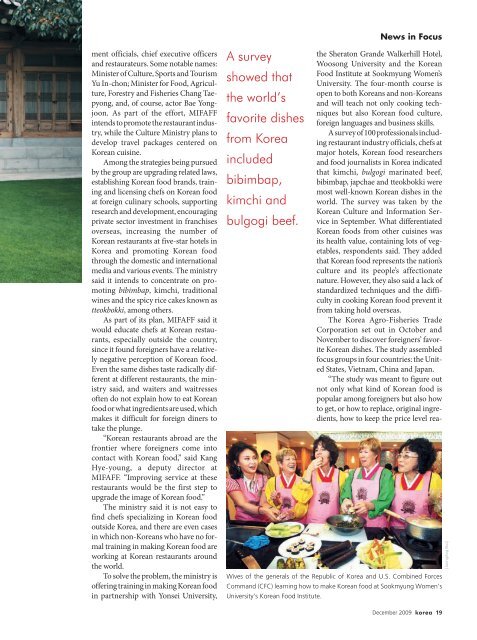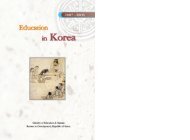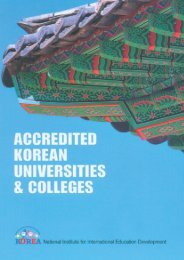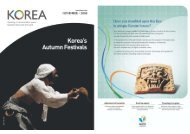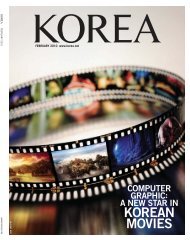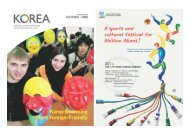2005-2162
12 Innovative Success Stories - Korea.net
12 Innovative Success Stories - Korea.net
- No tags were found...
You also want an ePaper? Increase the reach of your titles
YUMPU automatically turns print PDFs into web optimized ePapers that Google loves.
News in Focus<br />
ment officials, chief executive officers<br />
and restaurateurs. Some notable names:<br />
Minister of Culture, Sports and Tourism<br />
Yu In-chon; Minister for Food, Agriculture,<br />
Forestry and Fisheries Chang Taepyong,<br />
and, of course, actor Bae Yongjoon.<br />
As part of the effort, MIFAFF<br />
intends to promote the restaurant industry,<br />
while the Culture Ministry plans to<br />
develop travel packages centered on<br />
Korean cuisine.<br />
Among the strategies being pursued<br />
by the group are upgrading related laws,<br />
establishing Korean food brands, training<br />
and licensing chefs on Korean food<br />
at foreign culinary schools, supporting<br />
research and development, encouraging<br />
private sector investment in franchises<br />
overseas, increasing the number of<br />
Korean restaurants at five-star hotels in<br />
Korea and promoting Korean food<br />
through the domestic and international<br />
media and various events. The ministry<br />
said it intends to concentrate on promoting<br />
bibimbap, kimchi, traditional<br />
wines and the spicy rice cakes known as<br />
tteokbokki, among others.<br />
As part of its plan, MIFAFF said it<br />
would educate chefs at Korean restaurants,<br />
especially outside the country,<br />
since it found foreigners have a relatively<br />
negative perception of Korean food.<br />
Even the same dishes taste radically different<br />
at different restaurants, the ministry<br />
said, and waiters and waitresses<br />
often do not explain how to eat Korean<br />
food or what ingredients are used, which<br />
makes it difficult for foreign diners to<br />
take the plunge.<br />
“Korean restaurants abroad are the<br />
frontier where foreigners come into<br />
contact with Korean food,” said Kang<br />
Hye-young, a deputy director at<br />
MIFAFF. “Improving service at these<br />
restaurants would be the first step to<br />
upgrade the image of Korean food.”<br />
The ministry said it is not easy to<br />
find chefs specializing in Korean food<br />
outside Korea, and there are even cases<br />
in which non-Koreans who have no formal<br />
training in making Korean food are<br />
working at Korean restaurants around<br />
the world.<br />
To solve the problem, the ministry is<br />
offering training in making Korean food<br />
in partnership with Yonsei University,<br />
A survey<br />
showed that<br />
the world’s<br />
favorite dishes<br />
from Korea<br />
included<br />
bibimbap,<br />
kimchi and<br />
bulgogi beef.<br />
the Sheraton Grande Walkerhill Hotel,<br />
Woosong University and the Korean<br />
Food Institute at Sookmyung Women’s<br />
University. The four-month course is<br />
open to both Koreans and non-Koreans<br />
and will teach not only cooking techniques<br />
but also Korean food culture,<br />
foreign languages and business skills.<br />
A survey of 100 professionals including<br />
restaurant industry officials, chefs at<br />
major hotels, Korean food researchers<br />
and food journalists in Korea indicated<br />
that kimchi, bulgogi marinated beef,<br />
bibimbap, japchae and tteokbokki were<br />
most well-known Korean dishes in the<br />
world. The survey was taken by the<br />
Korean Culture and Information Service<br />
in September. What differentiated<br />
Korean foods from other cuisines was<br />
its health value, containing lots of vegetables,<br />
respondents said. They added<br />
that Korean food represents the nation’s<br />
culture and its people’s affectionate<br />
nature. However, they also said a lack of<br />
standardized techniques and the difficulty<br />
in cooking Korean food prevent it<br />
from taking hold overseas.<br />
The Korea Agro-Fisheries Trade<br />
Corporation set out in October and<br />
November to discover foreigners’ favorite<br />
Korean dishes. The study assembled<br />
focus groups in four countries: the United<br />
States, Vietnam, China and Japan.<br />
“The study was meant to figure out<br />
not only what kind of Korean food is<br />
popular among foreigners but also how<br />
to get, or how to replace, original ingredients,<br />
how to keep the price level rea-<br />
Wives of the generals of the Republic of Korea and U.S. Combined Forces<br />
Command (CFC) learning how to make Korean food at Sookmyung Women’s<br />
University’s Korean Food Institute.<br />
[JoongAng Ilbo]<br />
December 2009 korea 19


